Citizenship | Famous Books for UPSC Exam (Summary & Tests) PDF Download
Citizenship in India
Citizenship refers to the legal status that recognizes an individual as a lawful member of a country or nation.
In India, the Constitution talks about citizenship in Articles 5 to 11. It means having all the civil and political rights that come with being part of the State.
Constitutional and Statutory Basis and Citizens' Rights
- The population within a state is categorized into citizens and aliens.
- Citizens enjoy complete civil and political rights, while aliens do not possess all these rights.
- Aliens can be further classified into "non-citizen residents" and "foreign nationals."
- Enemy aliens face additional restrictions under clauses (1) and (2) of Article 22.
- Citizens are integral members of the political community to which they belong, constituting the state itself.
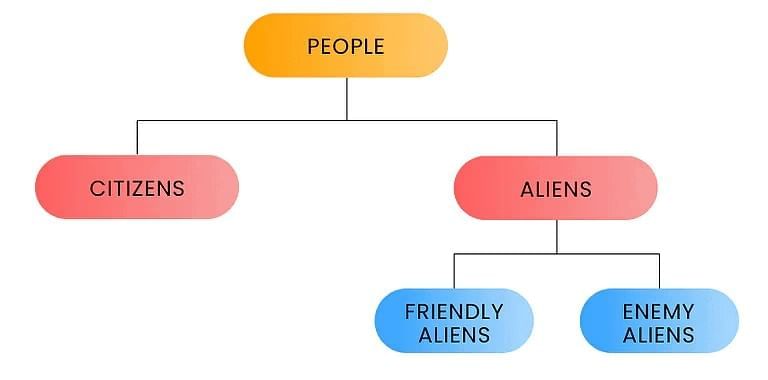
Single Citizenship in India
Single citizenship means that a person is a citizen of the entire country. The Indian Constitution is federal in nature, but it grants single citizenship to all Indians. This means that Indian citizenship is unique and exclusive.
- Our Constitution, while being federal, does not allow for dual citizenship.
- In some federal countries, like the USA, dual citizenship is allowed, while other nations have different rules regarding citizenship.
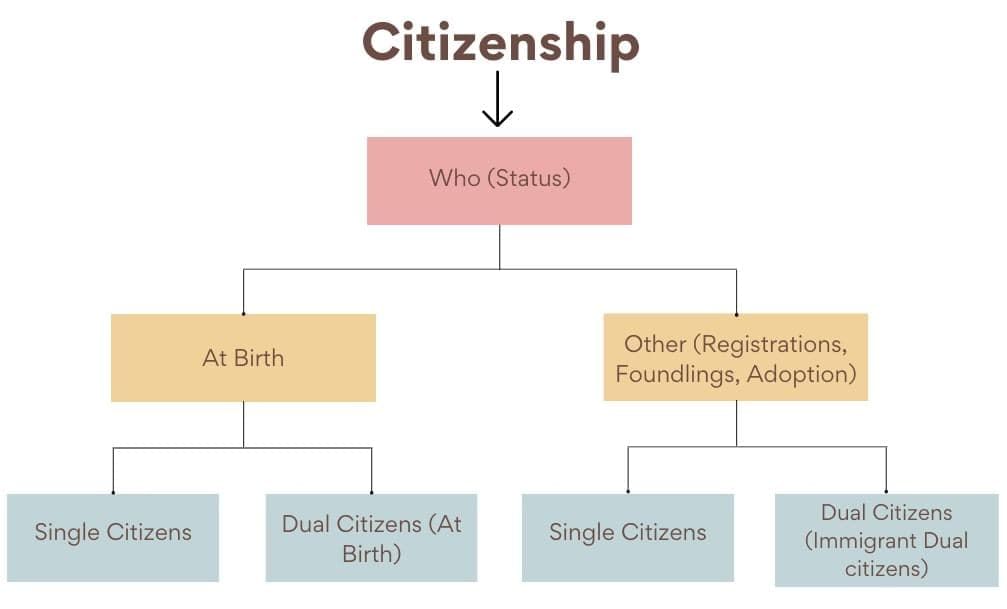
Citizenship as Status
- The Constitution of India established a framework for citizenship laws that can be updated as necessary.
- It initially specified the groups of people who would be recognised as citizens when the Constitution came into force.
- Subsequently, Parliament enacted the Citizenship Act in 1955.
- Articles 5 to 11 of Part II of the Constitution, along with later amendments, specify the procedures for acquiring and losing citizenship.
Citizens of India enjoy certain rights under the Constitution that are not available to non-citizens:
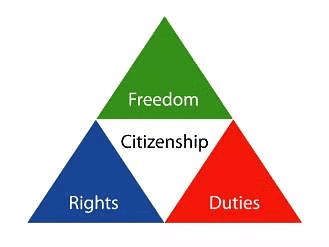
- Fundamental Rights: Some Fundamental Rights, especially those in Articles 15 and 16, are exclusive to citizens.
- Government Positions: Only citizens can hold key positions such as President, Vice President, Supreme Court and High Court Judges, Attorney General, state Governors, and Advocate Generals.
- Right to Vote: Voting in elections for the House of People and State Legislative Assemblies is restricted to citizens who meet certain legal criteria.
These rights are denied to non-citizens, regardless of their status as friendly or hostile. However, hostile non-citizens face additional restrictions, such as the lack of protections under Article 22 concerning arrest and detention.
An enemy alien refers to individuals who are nationals of an enemy state, regardless of whether they reside in India or abroad. Indian citizens, even if living in that state, are not considered enemy aliens, though their activities may be restricted or scrutinized during wartime.
Articles 5- 11
Articles 5 – 11 of the Constitution focus on the idea of citizenship.
(a) Article 5
Citizenship at the commencement of the Constitution.
At the beginning of the Constitution, individuals were considered citizens of India if they had their home in India and met at least one of the following criteria:
- Born in India: Individuals born in India were granted citizenship.
- Parentage: Individuals with at least one parent born in India were eligible for citizenship.
- Residence: Individuals who had lived in India for a minimum of five years before the Constitution came into effect were also considered citizens.
(b) Article 6
Rights of citizenship for certain people who have migrated to India from Pakistan.
Article 6 outlines the conditions under which individuals who migrated from what is now Pakistan could be recognized as citizens of India at the inception of the Constitution, regardless of the stipulations in Article 5.
Criteria for Citizenship
- Ancestry: They, their parents, or their grandparents were born in India as per the constitutional definition.
- Migration Date: If they migrated before 19 July 1948, they must have lived in India continuously since their migration.
- Post-Migration Requirements: If they migrated on or after 19 July 1948, they needed to be registered as citizens by a government officer. This required applying before the Constitution came into force and living in India for at least six months before applying.
(c) Article 7
Rights of citizenship for certain migrants to Pakistan.
- Article 7 specifies that individuals who migrated from India to Pakistan after 1 March 1947 would not be recognized as citizens of India, despite the provisions in Articles 5 and 6.
- Exception: However, this restriction does not apply to individuals who moved to Pakistan and later returned to India under a legal resettlement permit. These individuals would be treated as if they migrated to India after 19 July 1948 for the purposes of Article 6.
(d) Article 8
Rights of Citizenship for Persons of Indian Origin Residing Outside India.
- According to this article, individuals who are born in India or have Indian parents or grandparents are considered citizens of India, even if they live in another country.
- However, they must apply for registration with the Indian diplomatic or consular office in that country. This provision applies regardless of whether the application was made before or after the Constitution came into effect.
(e) Article 9
Persons voluntarily acquiring citizenship of a foreign State not to be citizens.
- Article 9 of the Constitution states that an individual cannot be considered a citizen of India if they have voluntarily acquired the citizenship of another country.
- This provision ensures that individuals who choose to become citizens of another country cannot simultaneously hold Indian citizenship.
(f) Article 10
Continuance of Citizenship Rights
- Article 10 of the Constitution ensures that individuals who are considered citizens of India under the previous articles will continue to hold that status, subject to any laws passed by Parliament.
- This provision guarantees the continuity of citizenship rights for individuals who qualify under the specified criteria.
(g) Article 11
Parliament's Authority on Citizenship
- Article 11 of the Constitution affirms the authority of Parliament to make laws regarding the acquisition and termination of citizenship, as well as other related matters.
- This article gives Parliament the power to regulate citizenship rights and responsibilities through legislation.
Part II of the Constitution
Part II of the Constitution simply describes classes if a person living in India at the commencement of the Constitution, i.e. 26th January 1950, and leaves the entire law of citizenship to be regulated by legislation made by the Parliament.
- In exercise of its power, the Parliament enacted the Indian Citizenship Act, 1955, which was subsequently amended in 1986.
- The Act provides for the acquisition of Indian citizenship after the commencement of the Constitution in five ways, i.e. birth, descent, registration, naturalization, and incorporation of territory.
Modes of Acquiring Indian Citizenship
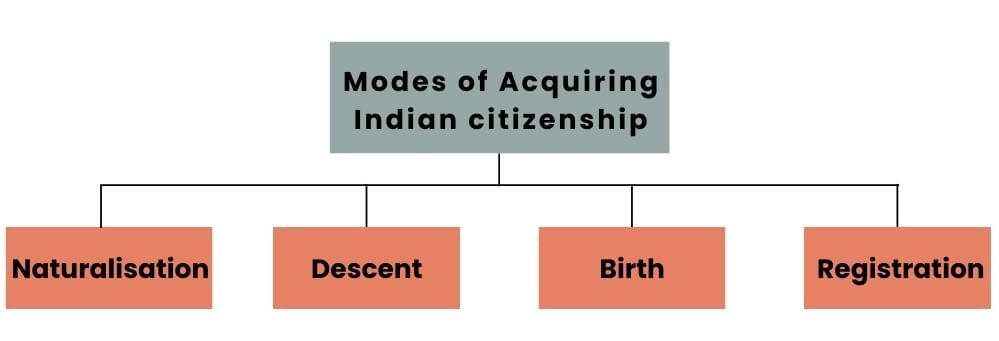
(a) By Birth
- A person born in India on or after 26 January 1950 is a citizen by birth (Jus Soli) if at least one parent is a citizen of India at the time of birth.
- This provision does not apply if the father is a diplomat from another country or an enemy alien at the time of birth.
(b) By Descent
- A person born outside India on or after 26 January 1950 is a citizen of India by descent if either parent is a citizen of India at the time of that person's birth, known as the law of blood (Jus Sanguinis).
(c) By Registration
- The prescribed authority may register as a citizen of India, any person who is not a citizen by virtue of the Constitution or the provisions of the Citizenship Act.
- Categories eligible for registration include:
a) Persons of Indian origin who have lived in India for 5 years immediately before applying.
b) Persons of Indian origin residing outside India.
c) Women who are, or have been, married to citizens of India.
(d) By Naturalisation
- Citizenship by naturalisation can be obtained by applying in the prescribed manner. The requirements for naturalisation include:
- Applicants must be of full age and capacity.
- They must not be a citizen of a country where Indian citizens are restricted from naturalisation.
- They must have renounced their previous citizenship.
- They must have lived in India or been in Government service for 12 months before applying, or have lived or served in Government for at least four years within the last seven years.
- Applicants must take an oath of allegiance.
- They should be of good character.
- They must possess adequate knowledge of a language recognised by the Constitution.
(e) By Incorporation of Territories
- When a new territory becomes part of India following a popular vote, the Government of India will determine who in that territory will be granted Indian citizenship.
Loss of Citizenship
The Citizenship Act of 1955 specifies three scenarios in which an Indian citizen can lose their citizenship: renunciation, termination, and deprivation.

(a) Renunciation
- Renunciation is a voluntary process where an individual willingly gives up their Indian citizenship after acquiring citizenship in another country. This process is subject to specific conditions.
(b) Termination
- Termination of citizenship occurs automatically under the law when an Indian citizen voluntarily acquires citizenship of another country, leading to the loss of Indian citizenship.
(c) Deprivation
- Deprivation involves the forced loss of Indian citizenship, which was obtained through registration or naturalisation, if it is found that the citizenship was acquired using fraudulent means.
Overseas Citizenship of India
The Overseas Citizenship of India (OCI) scheme was introduced in August 2005 as an amendment to the Citizenship Act of 1955. It was designed to address the demand for dual citizenship from the Indian diaspora living in developed countries. The scheme permits individuals of Indian origin holding foreign passports to obtain OCI status, provided they are not Indian citizens.
Officially launched in 2006 during the Pravasi Bharatiya Divas in Hyderabad, the OCI scheme replaced the earlier Person of Indian Origin (PIO) programme, which offered certain privileges to Indians living abroad. In 2015, the Indian government merged the PIO and OCI categories through the Citizenship (Amendment) Act, streamlining the benefits for overseas Indians.
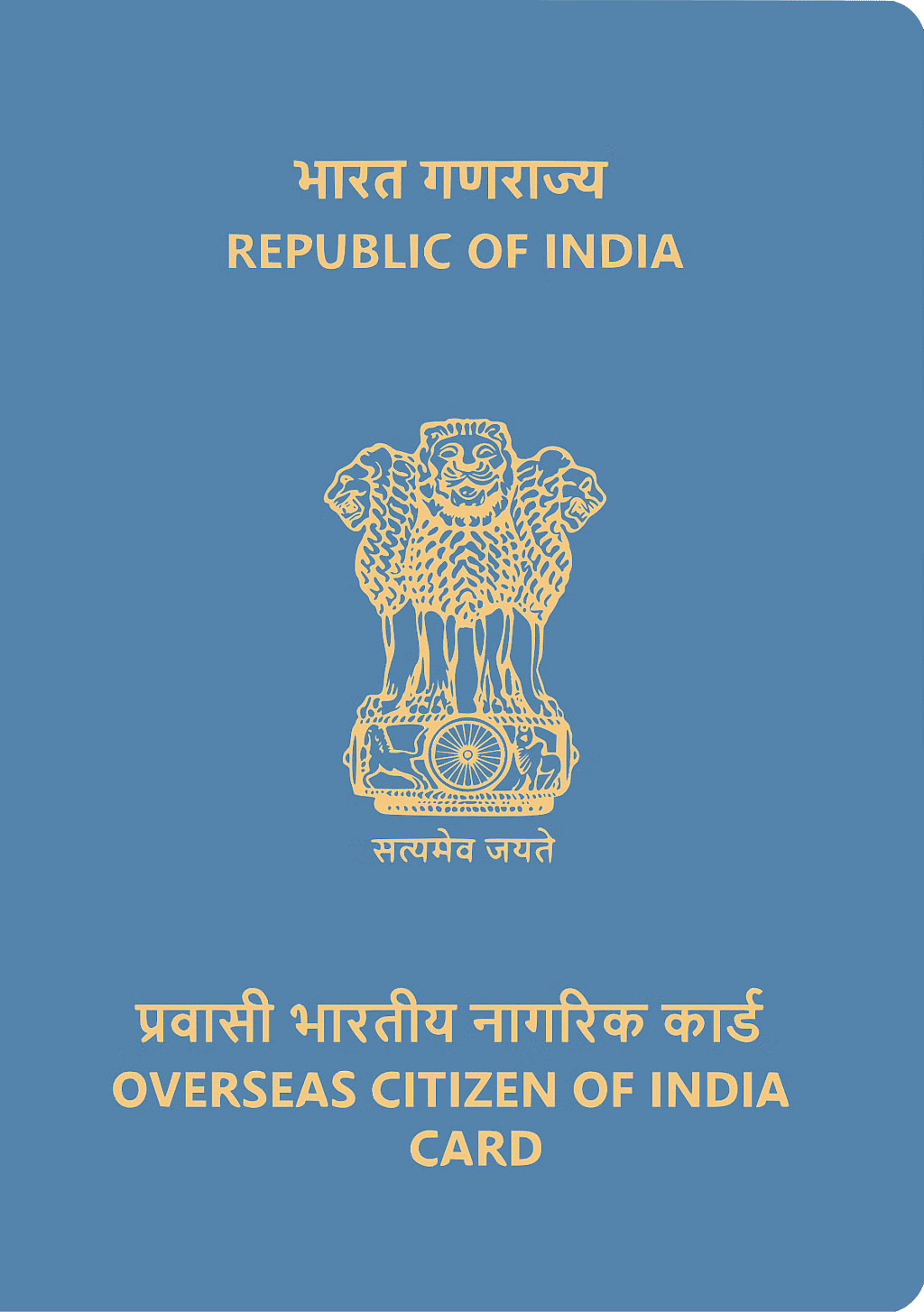 OCI Card
OCI Card
Background
- The Government of India established a High Level Committee on the Indian Diaspora in September 2000, chaired by L.M. Singhvi.
- The Committee's mandate was to conduct a comprehensive study of the global Indian Diaspora and to recommend measures to foster a positive relationship with them.
- The committee's report was due in January 2002.
- It proposed amending the Citizenship Act (1955) to allow for the grant of dual citizenship to Persons of Indian Origin (PIOs) from certain countries.
- As a result, the Citizenship (Amendment) Act, 2003, provided for the acquisition of Overseas Citizenship of India (OCI) by PIOs from 16 specified countries other than Pakistan and Bangladesh.
- It also removed from the Principal Act all provisions recognising or relating to Commonwealth Citizenship.
- Later, the Citizenship (Amendment) Act of 2005 broadened the scope of OCI grant to PIOs from all countries except Pakistan and Bangladesh, as long as their home countries allow dual citizenship under local law.
- It should be noted that the OCI is not a dual citizenship because the Indian Constitution prohibits dual citizenship or dual nationality (Article 9).
- Again, the Citizenship (Amendment) Act, 2015, modified the provisions of the Principal Act pertaining to OCI.
- By combining the PIO card scheme and the OCI card scheme, it has created a new scheme called "Overseas Citizen of India Cardholder."
- The PIO card scheme was implemented on August 19, 2002, and the OCI card scheme was implemented on December 2, 2005.
- Despite the fact that the OCI card scheme had become more popular, both schemes were running concurrently. This was causing applicants unnecessary confusion.
- Keeping in mind some of the issues that applicants were experiencing, the Government of India decided to create a single scheme by combining the PIO and OCI schemes.
- As a result, the Citizenship (Amendment) Act, 2015, was enacted to achieve this goal.
- The PIO scheme was cancelled on January 9, 2015, and it was also announced that all existing PIO card holders would be considered OCI card holders as of that date.
Action
- The Citizenship (Amendment) Act of 2003 made provisions for PIOs from 16 countries (excluding Bangladesh and Pakistan) to obtain OCI status.
- It eliminated references to Commonwealth Citizenship from the Principal Act.
Important Provisions
I. OCI - Registration
The Central Government may register as an overseas citizen of India cardholder:
- any person of full age and capacity,
- who is a citizen of another country, but was a citizen of India at the time of, or at any time after, the commencement of the Constitution;
- who is a citizen of another country, but was eligible to become a citizen of India at the time of, or at any time after, the commencement of the Constitution; or
- who is a citizen of another country but was born in a territory that became a part of India after August 15, 1947; or
- a person who is a minor child of a person mentioned in clause (a); or
- a person who is a minor child and whose both parents are citizens of India or one of the parents is a citizen of India; or
- spouse of a citizen of India or spouse of an Overseas Citizen of India Cardholder, whose marriage has been registered and subsisted for a continuous period of not less than two years immediately preceding the submission of the application.
- No person shall be eligible for registration as an Overseas Citizen of India Cardholder if he or she, or either of his or her parents, grandparents, or great grandparents, is or was a citizen of Pakistan, Bangladesh, or any other country specified by the Central Government.
- The Central Government may specify the date as of which existing persons of Indian origin cardholders will be considered overseas citizens of India cardholders.
- Notwithstanding anything in point (1), the Central Government may, if it is satisfied that special circumstances exist, register a person as an Overseas Citizen of India Cardholder after recording the circumstances in writing.
II. OCI - Conferment of Rights
- An overseas citizen of India cardholder is entitled to the rights specified by the Central Government in this regard.
- A cardholder who is an overseas citizen of India is not entitled to the following rights (which are conferred on a citizen of India)–
- He shall not be entitled to the right to equal opportunity in public employment.
- He is ineligible for election as President.
- He is ineligible for election as Vice President.
- He is ineligible for appointment as a Supreme Court Judge.
- He shall be ineligible for appointment as a High Court Judge.
- He is not eligible for voter registration.
- He shall be ineligible to serve in the House of People or the Council of States.
- He is ineligible to serve in the State Legislative Assembly or the State Legislative Council.
- He shall be ineligible for appointment to public services and posts in connection with Union or State affairs, except in such services and posts as the Central Government may specify.
III. OCI - Renunciation
- If any overseas citizen of India cardholder makes a declaration in the prescribed manner renouncing the card registering him as an overseas citizen of India cardholder.
- the declaration shall be registered by the Central Government, and that person shall cease to be an overseas citizen of India cardholder upon such registration.
- When a person ceases to be an overseas citizen of India cardholder,
- the spouse of that person of foreign origin and each minor child of that person registered as an OCI card holder ceases to be an overseas citizen of India cardholder.
IV. OCI - Cancellation of Registration
The Central Government may cancel a person's registration as an overseas citizen of India cardholder if the Central Government is satisfied that–
- Fraud or Misrepresentation: If the registration was obtained through fraudulent means, false representation, or by concealing essential facts, the government can cancel it.
- Disaffection towards the Constitution: If the cardholder demonstrates disaffection towards the Indian Constitution, it can be grounds for cancellation.
- Enemy Trading or Communication: Engaging in illegal trade or communication with an enemy during a war involving India is a serious offense that can lead to cancellation.
- Imprisonment: If the cardholder has been sentenced to imprisonment for a minimum of two years within five years of their registration, their status can be revoked.
- National Security and Sovereignty: Cancellation may be necessary for safeguarding the sovereignty, integrity, security of India, maintaining friendly relations with foreign countries, or protecting the general public.
- Marriage Issues: The government can cancel registration if the cardholder's marriage has been dissolved by a competent court or otherwise, or if they have married someone else while still being married to their first spouse.
Significance of Overseas Citizenship of India (OCI)
- OCI (Overseas Citizenship of India) should not be confused with dual citizenship as it does not grant political rights. OCI cardholders, who are individuals of Indian origin holding foreign passports and not Indian citizens, enjoy certain benefits.
- These include multiple entries into India, a lifelong visa for various purposes, and exemption from registering with the Foreigners Regional Registration Office (FRRO).
- After being registered as an OCI for a period of five years, individuals become eligible to apply for Indian citizenship. OCI cardholders also have access to special immigration counters at Indian international airports. They are permitted to open special bank accounts, purchase non-farm property, exercise ownership rights, and apply for a Permanent Account Number (PAN) card.
- However, it is important to note that foreign nationals in India on a Tourist Visa, Missionary Visa, or Mountaineering Visa are not eligible to apply for OCI. Additionally, to apply for OCI registration in India, the individual must be a regular resident of India.
- In summary, OCI provides certain privileges to individuals of Indian origin holding foreign passports, such as visa benefits, exemption from FRRO registration, and access to special immigration counters. While OCI does not grant political rights, it allows for eligibility to apply for Indian citizenship after a specified period.
- Certain restrictions apply, and the applicant must be a regular resident of India to apply for OCI registration within the country.
OCI is not regarded as dual citizenship (which is prohibited by Article 9 of the Constitution) according to the Citizenship (Amendment) Act of 2015.
Citizenship (Amendment) Act of 2005
- Expanded scope of OCI status to PIOs of all countries except Pakistan and Bangladesh
OCI not actually dual citizenship (prohibited by Article 9 of the Constitution)
Citizenship (Amendment) Act of 2015
- Modified OCI provisions
- Introduced OCI Cardholder Scheme by merging PIO card scheme (introduced 2002) and OCI card scheme (introduced 2005)
- Both had been running parallel, causing confusion
- PIO card scheme rescinded
- All existing PIO card holders deemed OCI cardholders
- Replaced nomenclature of "Overseas Citizens of India" with "Overseas Citizen of Indian Cardholder".
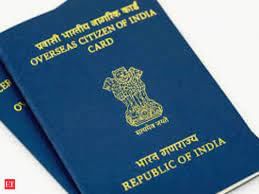 OCI Card
OCI Card
Registration of OCI Cardholder
1. Interested person has to register an application with the Central govt. On receiving the application, the Central govt can register as an OCI Cardholder
(a) Any person of full age and capacity
- Who is a citizen of another country, but was a citizen of India at the time of, or at any time after the commencement of the Constitution.
- Who is a citizen of another country, but was eligible to become a citizen of India at the time of the commencement of the Constitution
- Who is a citizen of another country, but belonged to a territory that became part of India after the 15th August 1947
- Who is a child or grandchild or a great-grandchild of such a citizen
(b) A person, who is a minor child of a person mentioned in clause (a); or
(c) A person, who is a minor child, and whose both parents are citizens of India or one of the parents is a citizen of India; or
(d) Spouse of foreign origin of a citizen of India or spouse of foreign origin of an OCI cardholder and whose marriage has been registered and subsisted for a continuous period of not less than two years immediately preceding the presentation of the application
- No person, who or either of whose parents or grandparents or great grandparents is or had been a citizen of Pakistan, Bangladesh or such a country as the Central Government may specify, shall be eligible for registration as an OCI Cardholder.
2. The Central Government may specify the date from which the existing persons of Indian Origin Cardholders shall be deemed to be OCI Cardholders (decided on 09-01-2015)
3. Notwithstanding anything contained in point (1), Central Government may, if it is satisfied that special circumstances exist, after recording the circumstances in writing, register a person as an OCI Cardholder.
Conferment of Rights of OCI Cardholders
(i) Entitled to rights as specified by the Central government.
(ii) NOT entitled to the following rights:
- Right to equality of opportunity in matters of public employment
- Not eligible for election as President, Vice-President, member of Parliament or State Legislative Assembly or State legislative Council.
- Not eligible for appointment as Judge of SC or HCs, or appoints to public services and posts in connection with affairs of the Union or of any state except when specified by the Central Government
- Not to be entitled to registration as a voter
Benefits of OCI Cardholders
- Multiple entry lifelong visa for visiting India for any purpose
But will need special permission to undertake research work - Exemption from registration with Foreigners Regional Registration Officer (FRRO) or Foreigners Registration Officer (FRO) for any length of stay in India.
- Parity with NRIs in respect of all facilities available to them in economic, financial and educational fields except in matters relating to the acquisition of agricultural or plantation properties
- NRIs have all benefits available to Indian citizens subject to notifications issued by the Government from time to time
- Charged same entry fee as domestic Indian visitors to visit national parks and wildlife sanctuaries in India
Renunciation of OCI Card
- OCI cardholder can make a declaration in the prescribed manner to renounce the card and her registration as a Cardholder
- The spouse of foreign origin of a such a person will also cease to be an OCI Cardholder
- Minor children of such a person will also cease to be an OCI Cardholder
Cancellation of OCI Card
Central Government can cancel the OCI Card if it is satisfied that:
- The card was obtained by fraud, false representation or concealment of material fact
- The cardholder has shown disaffection towards the Constitution of India
- The cardholder has unlawfully traded or communicated with an enemy with which India is at war
- Cardholder has been sentenced to two or more years of imprisonment within 5 years of obtaining the card
- It is necessary to do so in the interest of sovereignty and integrity of India, the security of India, friendly relations of India with any foreign country, or in the interests of the general public
- The marriage of an OCI cardholder has been dissolved by a competent court, or has not been dissolved by the Cardholder has also solemnised another marriage
Citizenship (Amendment) Bill 2019
The amendment proposes to permit members of six communities - Hindus, Sikhs, Buddhists, Jains, Parsis and Christians from Pakistan, Bangladesh and Afghanistan - to continue to live in India if they entered India before December 31, 2014.
- It also reduces the requirement for citizenship from 11 years to just 6 years.
- Two notifications also exempted these migrants from the Passport Act and Foreigners Act.
- A large number of organisations in Assam protested against this Bill as it may grant citizenship to Bangladeshi Hindu illegal migrants.
- The justification given for the bill is that Hindus and Buddhists are minorities in Bangladesh, and fled to India to avoid religious persecution, but Muslims are a majority in Bangladesh and so the same cannot be said about them.
Different Scenario in Assam
- Assam witnessed large-scale illegal migration from erstwhile East Pakistan and, after 1971, from present-day Bangladesh.
- This led to the six-year-long Assam movement from 1979 to 1985, for deporting illegal migrants.
- The All Assam Students' Union (AASU) led the movement that demanded the updating of the NRC and the deportation of all illegal migrants who had entered Assam after 1951.
- The Assam Movement against illegal immigration eventually led to the historic Assam Accord of 1985, signed by the Movement leaders and the Rajiv Gandhi government.
- It set March 25, 1971, as the cut-off date for the deportation of illegal migrants.
- Since the cut-off date prescribed under articles 5 and 6 of the Constitution was July 19, 1949 - to give force to the new date, an amendment was made to the Citizenship Act, 1955, and a new section (6A) was introduced.
Section 6A
- The section was made applicable only to Assam.
- It laid down that all persons of Indian origin who entered Assam before January 1, 1966, and have been ordinary residents will be deemed, Indian citizens.
- Those who came after 1 January 1966 but before March 25, 1971, and have been ordinary residents, will get citizenship at the expiry of 10 years from their detection as a foreigner.
- During this interim period, they will not have the right to vote but can get an Indian passport.
- In Assam Sanmilita Mahasangha (2014) where the constitutionality of the 1986 amendment was challenged (the Mahasangha argues that the cutoff year for Assam should be 1951 instead of 1971), the court referred the matter to the Constitution Bench.
- To examine whether Section 6A is constitutional and valid though it prescribes a different cutoff date for Assam (1971) from the one prescribed in the Constitution for the rest of the country (1949).
- A five-judge Bench of the Supreme Court is yet to examine the constitutionality of Section 6A under which the current NRC has been prepared.
|
745 videos|1444 docs|633 tests
|
FAQs on Citizenship - Famous Books for UPSC Exam (Summary & Tests)
| 1. What is the concept of single citizenship in India? |  |
| 2. What are the key Articles related to citizenship in the Indian Constitution? |  |
| 3. What is the Indian Citizenship Act of 1955? |  |
| 4. How can a person lose Indian citizenship? |  |
| 5. What are the rights conferred by the Overseas Citizenship of India (OCI)? |  |






















